Developing Individuals, Teams, and Organisations in Thomas Cook Group
VerifiedAdded on 2024/06/13
|26
|4902
|65
Report
AI Summary
This report analyzes the development of individuals, teams, and organizations within the context of Thomas Cook, a British airline. It examines the knowledge, skills, and behaviors required of HR professionals, using a personal skills audit to identify areas for improvement in a given job role. The report differentiates between organizational and individual learning, training, and development, emphasizing the need for continuous professional development to drive sustainable business performance. It applies learning cycle theories and proposes a professional development plan with specific learning goals and training. Furthermore, the report explores how High-Performance Work practices (HPW) contribute to employee engagement and competitive advantage within Thomas Cook, evaluating different approaches to performance management and their impact on fostering a high-performance culture and commitment. The analysis culminates in a synthesis of knowledge on how HPW mechanisms lead to improved employee engagement, commitment, and competitive advantage.
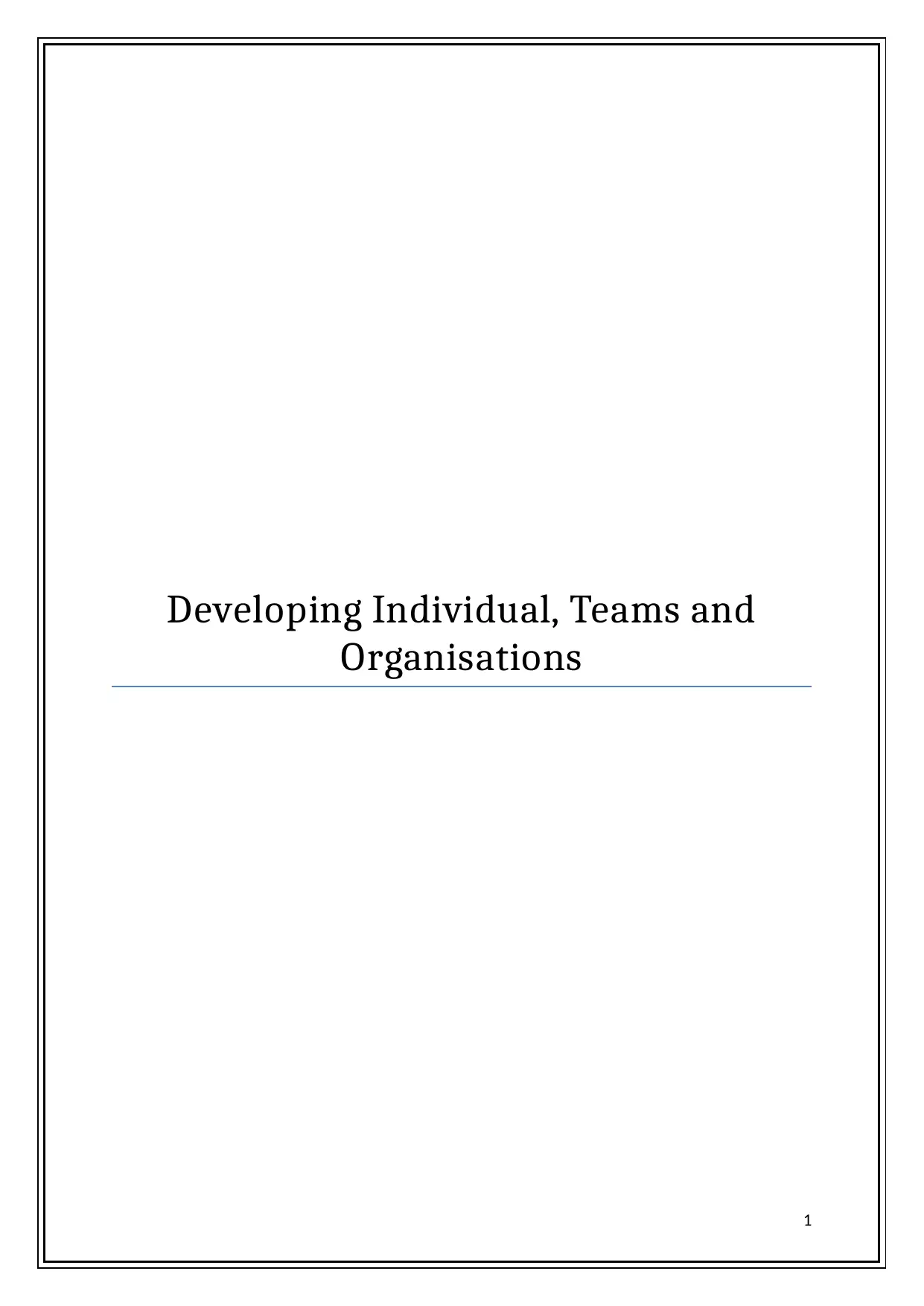
Developing Individual, Teams and
Organisations
1
Organisations
1
Paraphrase This Document
Need a fresh take? Get an instant paraphrase of this document with our AI Paraphraser
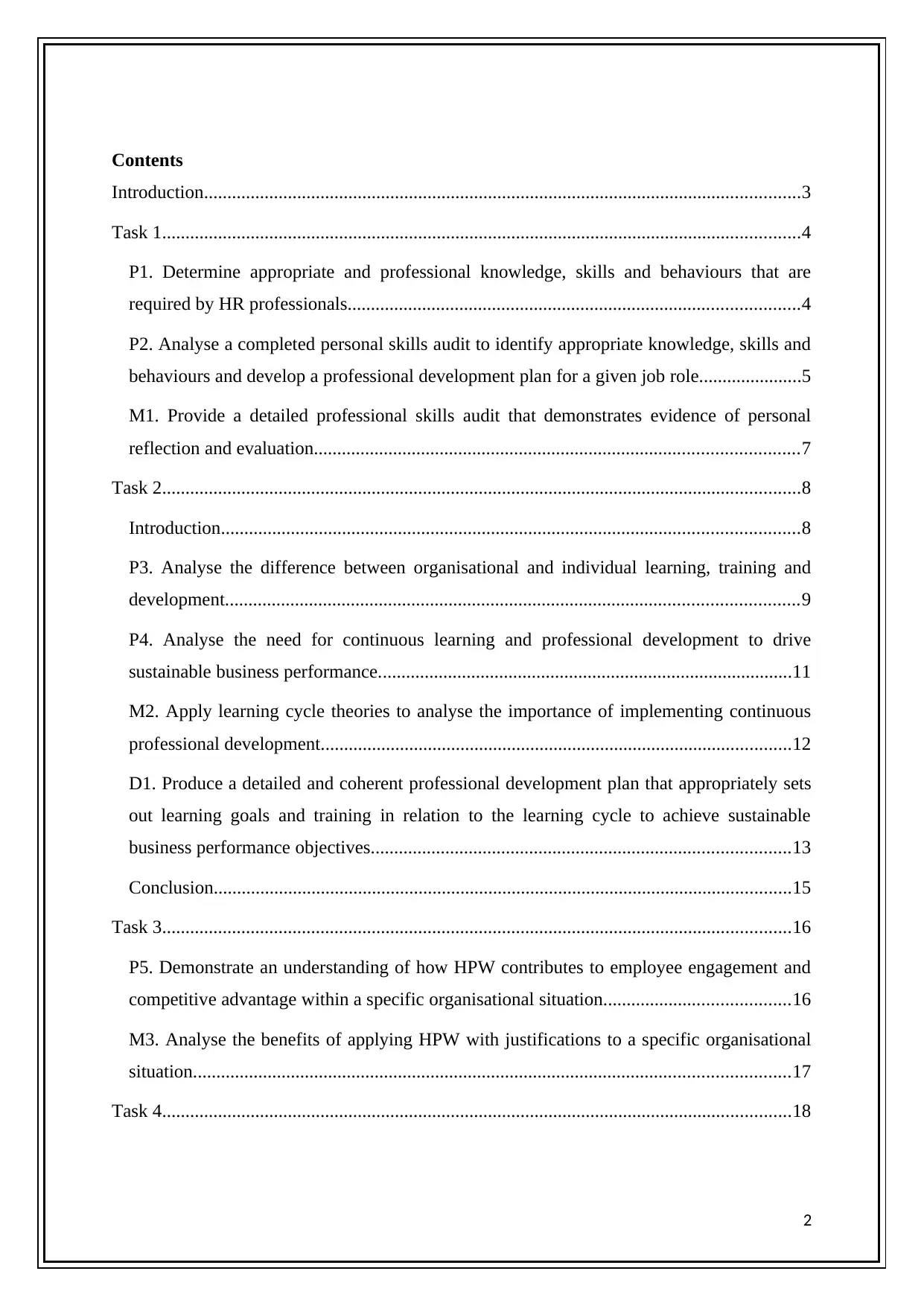
Contents
Introduction................................................................................................................................3
Task 1.........................................................................................................................................4
P1. Determine appropriate and professional knowledge, skills and behaviours that are
required by HR professionals.................................................................................................4
P2. Analyse a completed personal skills audit to identify appropriate knowledge, skills and
behaviours and develop a professional development plan for a given job role......................5
M1. Provide a detailed professional skills audit that demonstrates evidence of personal
reflection and evaluation........................................................................................................7
Task 2.........................................................................................................................................8
Introduction............................................................................................................................8
P3. Analyse the difference between organisational and individual learning, training and
development...........................................................................................................................9
P4. Analyse the need for continuous learning and professional development to drive
sustainable business performance.........................................................................................11
M2. Apply learning cycle theories to analyse the importance of implementing continuous
professional development.....................................................................................................12
D1. Produce a detailed and coherent professional development plan that appropriately sets
out learning goals and training in relation to the learning cycle to achieve sustainable
business performance objectives..........................................................................................13
Conclusion............................................................................................................................15
Task 3.......................................................................................................................................16
P5. Demonstrate an understanding of how HPW contributes to employee engagement and
competitive advantage within a specific organisational situation........................................16
M3. Analyse the benefits of applying HPW with justifications to a specific organisational
situation................................................................................................................................17
Task 4.......................................................................................................................................18
2
Introduction................................................................................................................................3
Task 1.........................................................................................................................................4
P1. Determine appropriate and professional knowledge, skills and behaviours that are
required by HR professionals.................................................................................................4
P2. Analyse a completed personal skills audit to identify appropriate knowledge, skills and
behaviours and develop a professional development plan for a given job role......................5
M1. Provide a detailed professional skills audit that demonstrates evidence of personal
reflection and evaluation........................................................................................................7
Task 2.........................................................................................................................................8
Introduction............................................................................................................................8
P3. Analyse the difference between organisational and individual learning, training and
development...........................................................................................................................9
P4. Analyse the need for continuous learning and professional development to drive
sustainable business performance.........................................................................................11
M2. Apply learning cycle theories to analyse the importance of implementing continuous
professional development.....................................................................................................12
D1. Produce a detailed and coherent professional development plan that appropriately sets
out learning goals and training in relation to the learning cycle to achieve sustainable
business performance objectives..........................................................................................13
Conclusion............................................................................................................................15
Task 3.......................................................................................................................................16
P5. Demonstrate an understanding of how HPW contributes to employee engagement and
competitive advantage within a specific organisational situation........................................16
M3. Analyse the benefits of applying HPW with justifications to a specific organisational
situation................................................................................................................................17
Task 4.......................................................................................................................................18
2
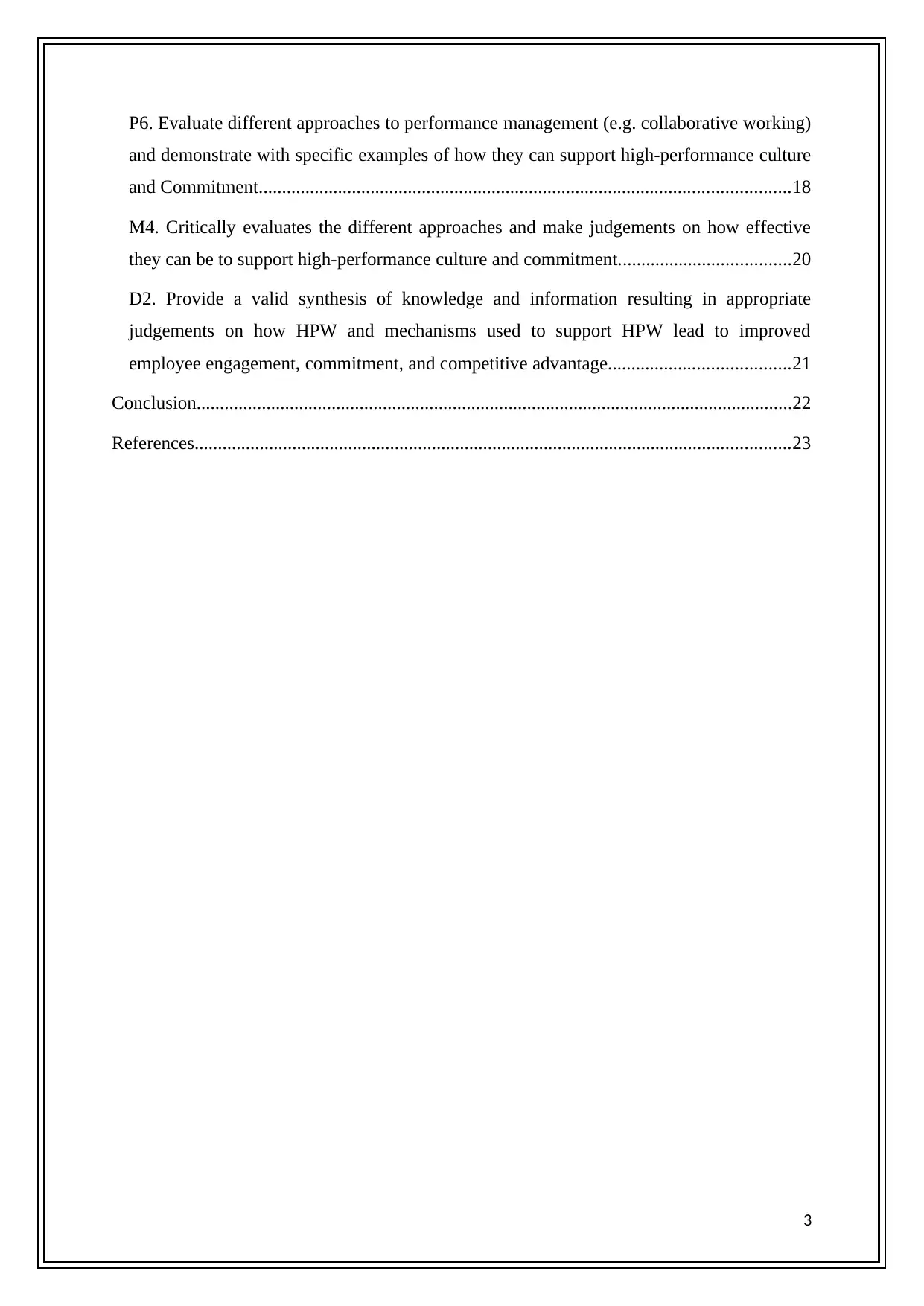
P6. Evaluate different approaches to performance management (e.g. collaborative working)
and demonstrate with specific examples of how they can support high-performance culture
and Commitment..................................................................................................................18
M4. Critically evaluates the different approaches and make judgements on how effective
they can be to support high-performance culture and commitment.....................................20
D2. Provide a valid synthesis of knowledge and information resulting in appropriate
judgements on how HPW and mechanisms used to support HPW lead to improved
employee engagement, commitment, and competitive advantage.......................................21
Conclusion................................................................................................................................22
References................................................................................................................................23
3
and demonstrate with specific examples of how they can support high-performance culture
and Commitment..................................................................................................................18
M4. Critically evaluates the different approaches and make judgements on how effective
they can be to support high-performance culture and commitment.....................................20
D2. Provide a valid synthesis of knowledge and information resulting in appropriate
judgements on how HPW and mechanisms used to support HPW lead to improved
employee engagement, commitment, and competitive advantage.......................................21
Conclusion................................................................................................................................22
References................................................................................................................................23
3
⊘ This is a preview!⊘
Do you want full access?
Subscribe today to unlock all pages.

Trusted by 1+ million students worldwide
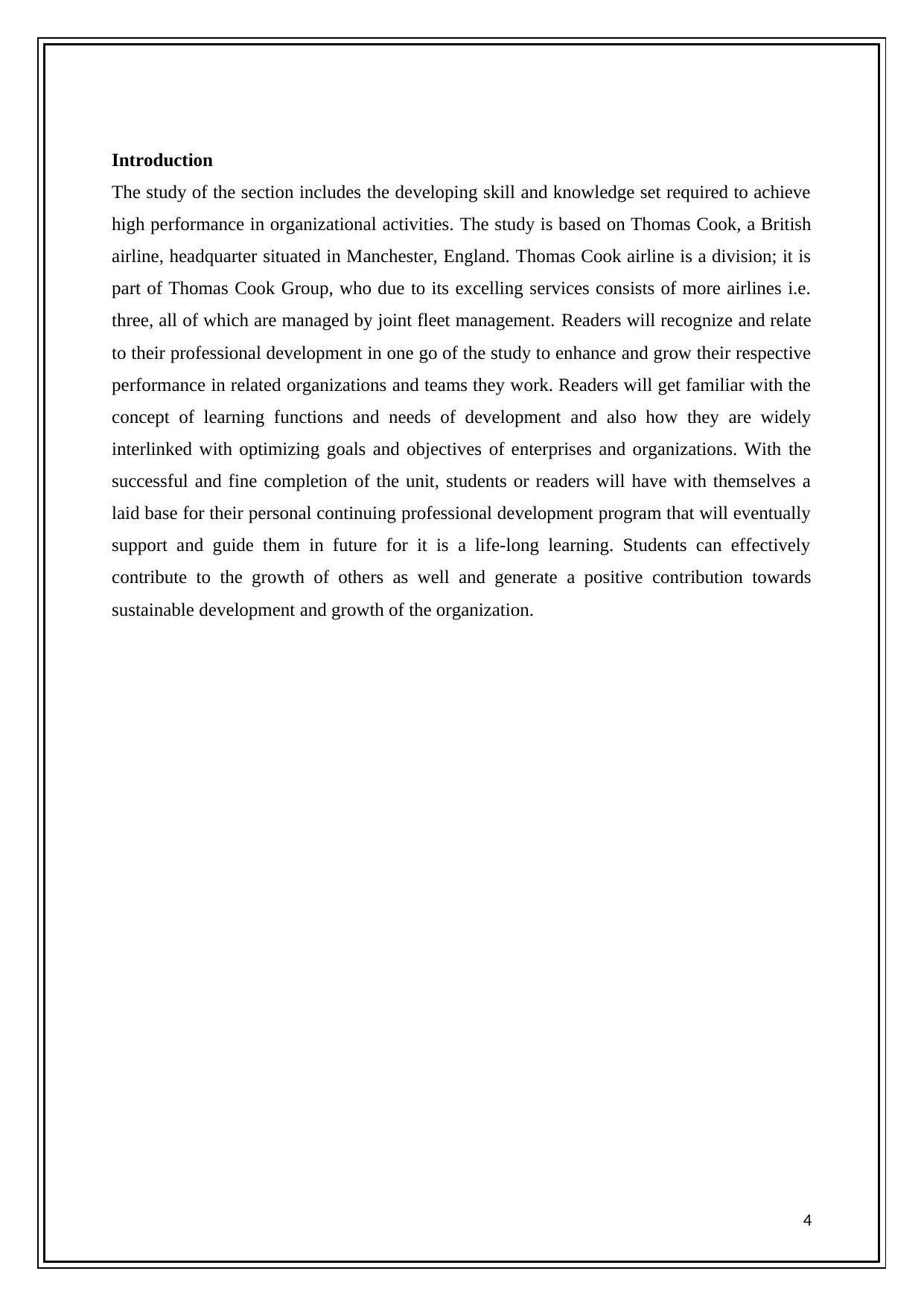
Introduction
The study of the section includes the developing skill and knowledge set required to achieve
high performance in organizational activities. The study is based on Thomas Cook, a British
airline, headquarter situated in Manchester, England. Thomas Cook airline is a division; it is
part of Thomas Cook Group, who due to its excelling services consists of more airlines i.e.
three, all of which are managed by joint fleet management. Readers will recognize and relate
to their professional development in one go of the study to enhance and grow their respective
performance in related organizations and teams they work. Readers will get familiar with the
concept of learning functions and needs of development and also how they are widely
interlinked with optimizing goals and objectives of enterprises and organizations. With the
successful and fine completion of the unit, students or readers will have with themselves a
laid base for their personal continuing professional development program that will eventually
support and guide them in future for it is a life-long learning. Students can effectively
contribute to the growth of others as well and generate a positive contribution towards
sustainable development and growth of the organization.
4
The study of the section includes the developing skill and knowledge set required to achieve
high performance in organizational activities. The study is based on Thomas Cook, a British
airline, headquarter situated in Manchester, England. Thomas Cook airline is a division; it is
part of Thomas Cook Group, who due to its excelling services consists of more airlines i.e.
three, all of which are managed by joint fleet management. Readers will recognize and relate
to their professional development in one go of the study to enhance and grow their respective
performance in related organizations and teams they work. Readers will get familiar with the
concept of learning functions and needs of development and also how they are widely
interlinked with optimizing goals and objectives of enterprises and organizations. With the
successful and fine completion of the unit, students or readers will have with themselves a
laid base for their personal continuing professional development program that will eventually
support and guide them in future for it is a life-long learning. Students can effectively
contribute to the growth of others as well and generate a positive contribution towards
sustainable development and growth of the organization.
4
Paraphrase This Document
Need a fresh take? Get an instant paraphrase of this document with our AI Paraphraser
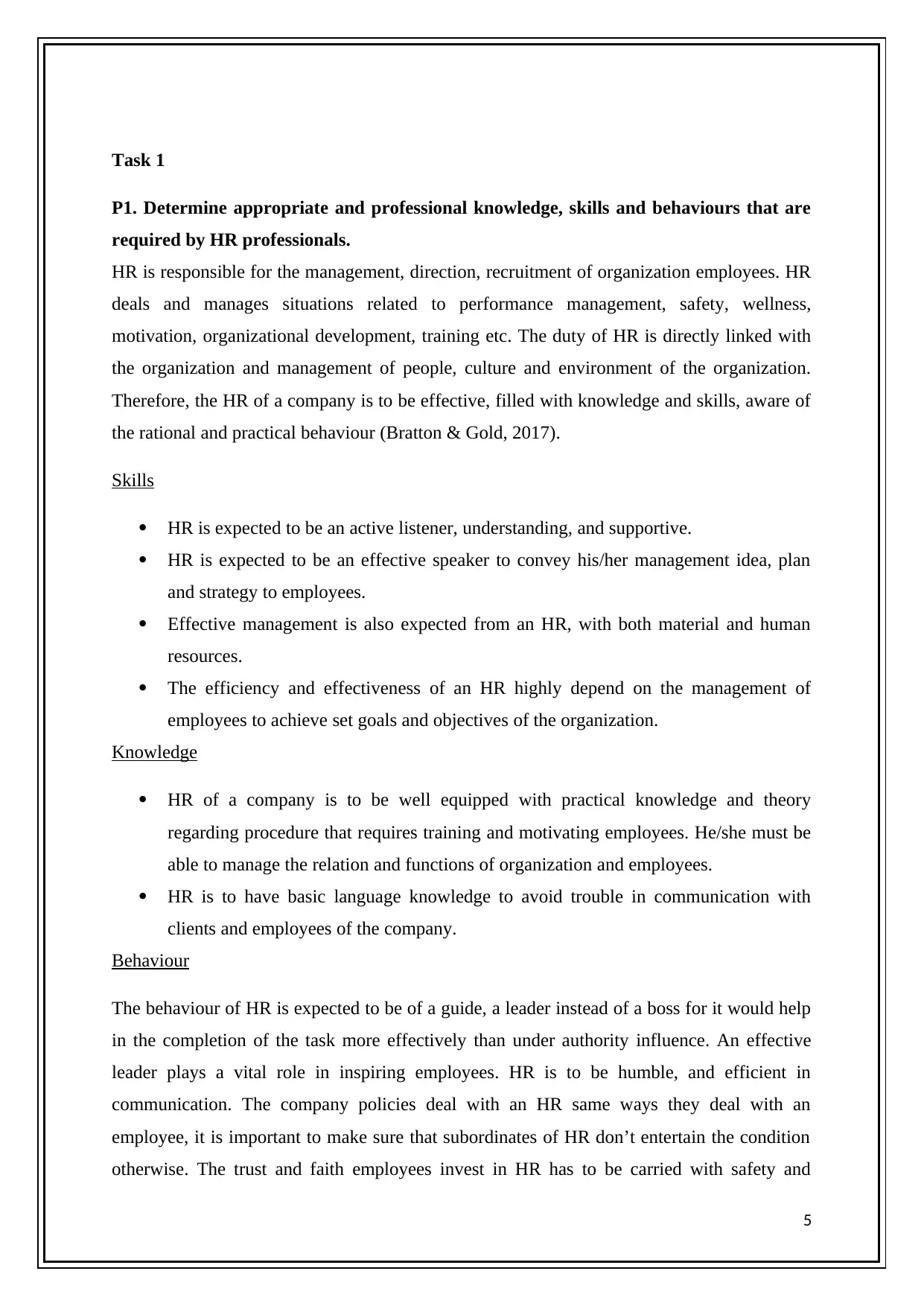
Task 1
P1. Determine appropriate and professional knowledge, skills and behaviours that are
required by HR professionals.
HR is responsible for the management, direction, recruitment of organization employees. HR
deals and manages situations related to performance management, safety, wellness,
motivation, organizational development, training etc. The duty of HR is directly linked with
the organization and management of people, culture and environment of the organization.
Therefore, the HR of a company is to be effective, filled with knowledge and skills, aware of
the rational and practical behaviour (Bratton & Gold, 2017).
Skills
HR is expected to be an active listener, understanding, and supportive.
HR is expected to be an effective speaker to convey his/her management idea, plan
and strategy to employees.
Effective management is also expected from an HR, with both material and human
resources.
The efficiency and effectiveness of an HR highly depend on the management of
employees to achieve set goals and objectives of the organization.
Knowledge
HR of a company is to be well equipped with practical knowledge and theory
regarding procedure that requires training and motivating employees. He/she must be
able to manage the relation and functions of organization and employees.
HR is to have basic language knowledge to avoid trouble in communication with
clients and employees of the company.
Behaviour
The behaviour of HR is expected to be of a guide, a leader instead of a boss for it would help
in the completion of the task more effectively than under authority influence. An effective
leader plays a vital role in inspiring employees. HR is to be humble, and efficient in
communication. The company policies deal with an HR same ways they deal with an
employee, it is important to make sure that subordinates of HR don’t entertain the condition
otherwise. The trust and faith employees invest in HR has to be carried with safety and
5
P1. Determine appropriate and professional knowledge, skills and behaviours that are
required by HR professionals.
HR is responsible for the management, direction, recruitment of organization employees. HR
deals and manages situations related to performance management, safety, wellness,
motivation, organizational development, training etc. The duty of HR is directly linked with
the organization and management of people, culture and environment of the organization.
Therefore, the HR of a company is to be effective, filled with knowledge and skills, aware of
the rational and practical behaviour (Bratton & Gold, 2017).
Skills
HR is expected to be an active listener, understanding, and supportive.
HR is expected to be an effective speaker to convey his/her management idea, plan
and strategy to employees.
Effective management is also expected from an HR, with both material and human
resources.
The efficiency and effectiveness of an HR highly depend on the management of
employees to achieve set goals and objectives of the organization.
Knowledge
HR of a company is to be well equipped with practical knowledge and theory
regarding procedure that requires training and motivating employees. He/she must be
able to manage the relation and functions of organization and employees.
HR is to have basic language knowledge to avoid trouble in communication with
clients and employees of the company.
Behaviour
The behaviour of HR is expected to be of a guide, a leader instead of a boss for it would help
in the completion of the task more effectively than under authority influence. An effective
leader plays a vital role in inspiring employees. HR is to be humble, and efficient in
communication. The company policies deal with an HR same ways they deal with an
employee, it is important to make sure that subordinates of HR don’t entertain the condition
otherwise. The trust and faith employees invest in HR has to be carried with safety and
5
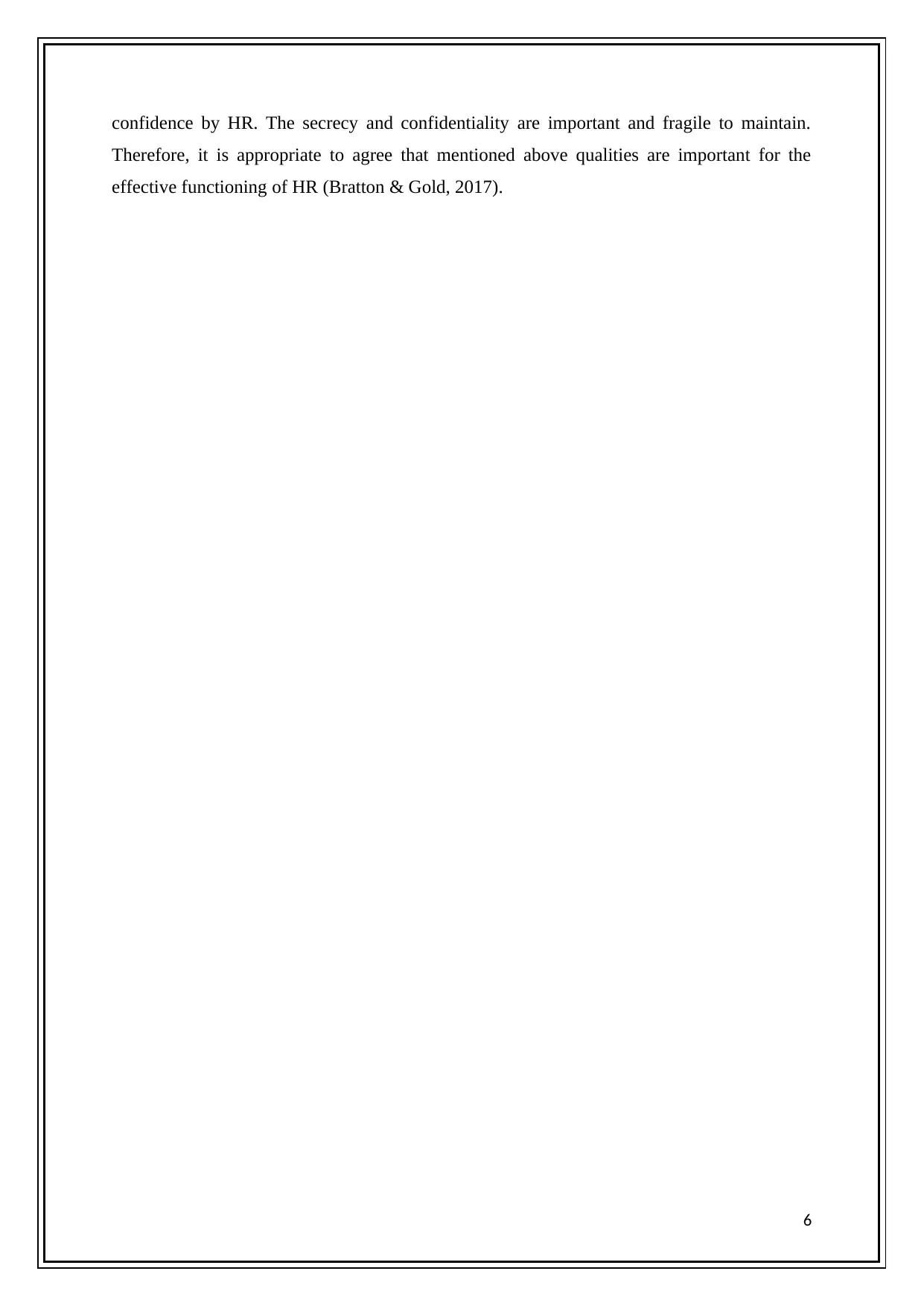
confidence by HR. The secrecy and confidentiality are important and fragile to maintain.
Therefore, it is appropriate to agree that mentioned above qualities are important for the
effective functioning of HR (Bratton & Gold, 2017).
6
Therefore, it is appropriate to agree that mentioned above qualities are important for the
effective functioning of HR (Bratton & Gold, 2017).
6
⊘ This is a preview!⊘
Do you want full access?
Subscribe today to unlock all pages.

Trusted by 1+ million students worldwide
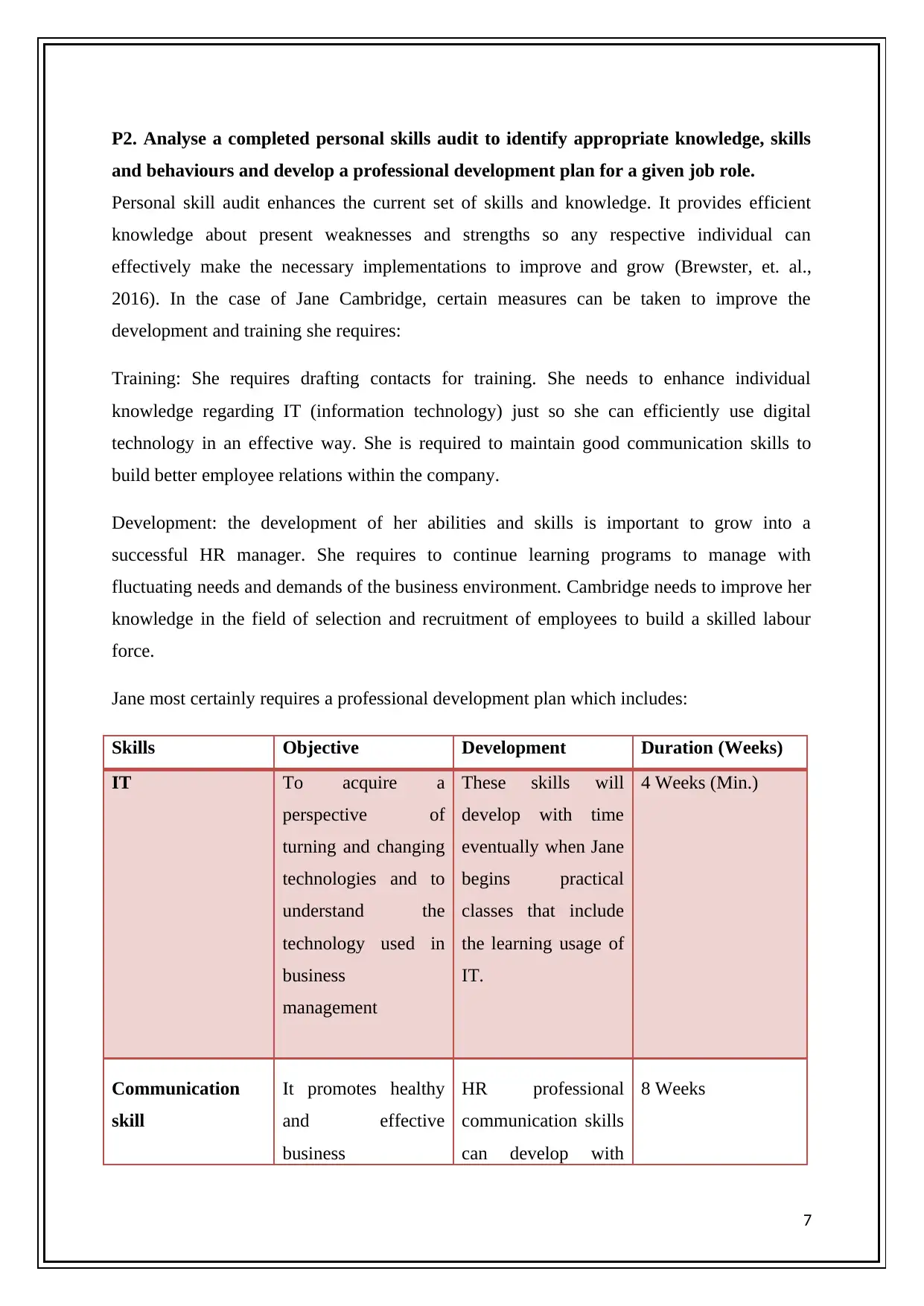
P2. Analyse a completed personal skills audit to identify appropriate knowledge, skills
and behaviours and develop a professional development plan for a given job role.
Personal skill audit enhances the current set of skills and knowledge. It provides efficient
knowledge about present weaknesses and strengths so any respective individual can
effectively make the necessary implementations to improve and grow (Brewster, et. al.,
2016). In the case of Jane Cambridge, certain measures can be taken to improve the
development and training she requires:
Training: She requires drafting contacts for training. She needs to enhance individual
knowledge regarding IT (information technology) just so she can efficiently use digital
technology in an effective way. She is required to maintain good communication skills to
build better employee relations within the company.
Development: the development of her abilities and skills is important to grow into a
successful HR manager. She requires to continue learning programs to manage with
fluctuating needs and demands of the business environment. Cambridge needs to improve her
knowledge in the field of selection and recruitment of employees to build a skilled labour
force.
Jane most certainly requires a professional development plan which includes:
Skills Objective Development Duration (Weeks)
IT To acquire a
perspective of
turning and changing
technologies and to
understand the
technology used in
business
management
These skills will
develop with time
eventually when Jane
begins practical
classes that include
the learning usage of
IT.
4 Weeks (Min.)
Communication
skill
It promotes healthy
and effective
business
HR professional
communication skills
can develop with
8 Weeks
7
and behaviours and develop a professional development plan for a given job role.
Personal skill audit enhances the current set of skills and knowledge. It provides efficient
knowledge about present weaknesses and strengths so any respective individual can
effectively make the necessary implementations to improve and grow (Brewster, et. al.,
2016). In the case of Jane Cambridge, certain measures can be taken to improve the
development and training she requires:
Training: She requires drafting contacts for training. She needs to enhance individual
knowledge regarding IT (information technology) just so she can efficiently use digital
technology in an effective way. She is required to maintain good communication skills to
build better employee relations within the company.
Development: the development of her abilities and skills is important to grow into a
successful HR manager. She requires to continue learning programs to manage with
fluctuating needs and demands of the business environment. Cambridge needs to improve her
knowledge in the field of selection and recruitment of employees to build a skilled labour
force.
Jane most certainly requires a professional development plan which includes:
Skills Objective Development Duration (Weeks)
IT To acquire a
perspective of
turning and changing
technologies and to
understand the
technology used in
business
management
These skills will
develop with time
eventually when Jane
begins practical
classes that include
the learning usage of
IT.
4 Weeks (Min.)
Communication
skill
It promotes healthy
and effective
business
HR professional
communication skills
can develop with
8 Weeks
7
Paraphrase This Document
Need a fresh take? Get an instant paraphrase of this document with our AI Paraphraser
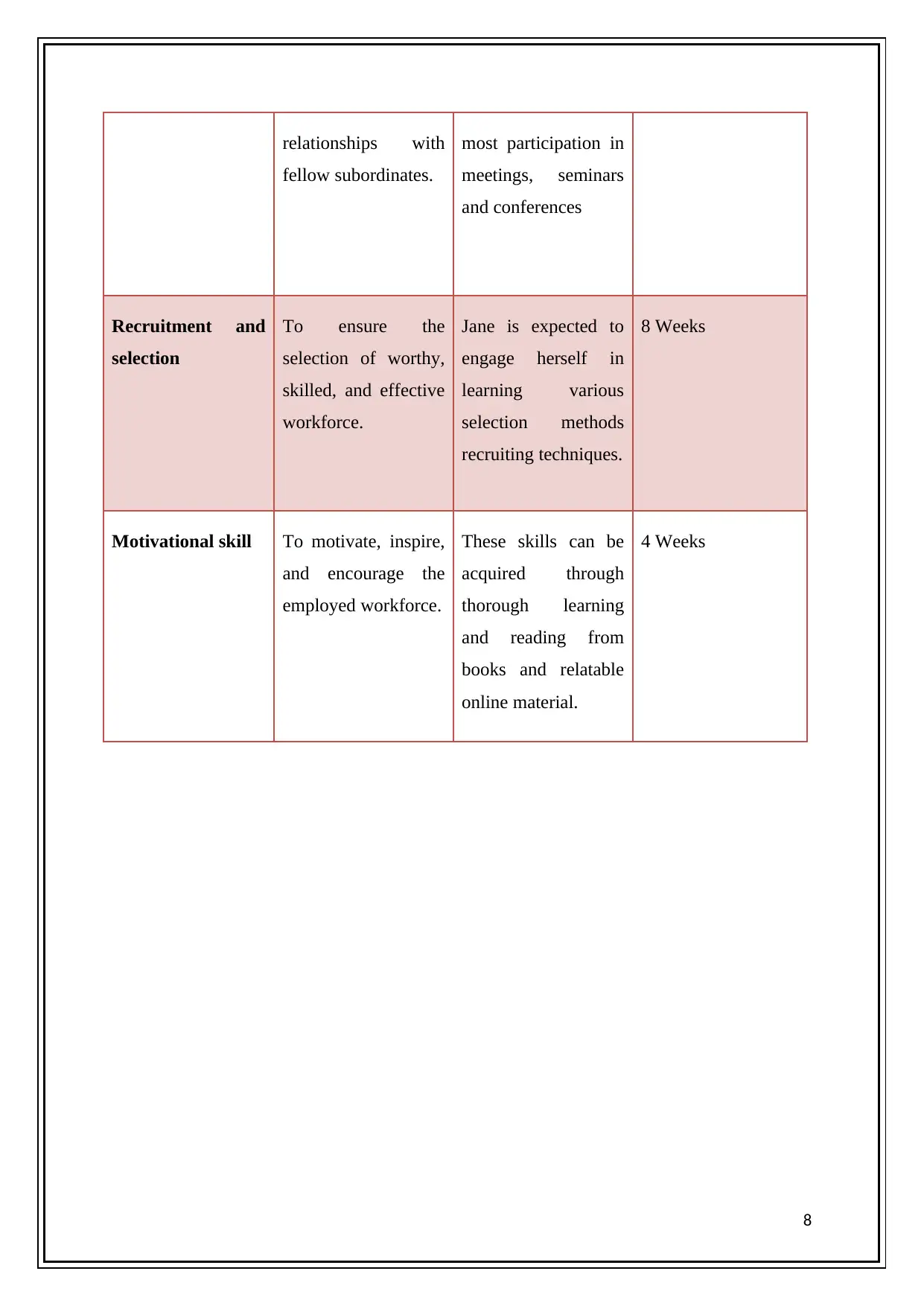
relationships with
fellow subordinates.
most participation in
meetings, seminars
and conferences
Recruitment and
selection
To ensure the
selection of worthy,
skilled, and effective
workforce.
Jane is expected to
engage herself in
learning various
selection methods
recruiting techniques.
8 Weeks
Motivational skill To motivate, inspire,
and encourage the
employed workforce.
These skills can be
acquired through
thorough learning
and reading from
books and relatable
online material.
4 Weeks
8
fellow subordinates.
most participation in
meetings, seminars
and conferences
Recruitment and
selection
To ensure the
selection of worthy,
skilled, and effective
workforce.
Jane is expected to
engage herself in
learning various
selection methods
recruiting techniques.
8 Weeks
Motivational skill To motivate, inspire,
and encourage the
employed workforce.
These skills can be
acquired through
thorough learning
and reading from
books and relatable
online material.
4 Weeks
8
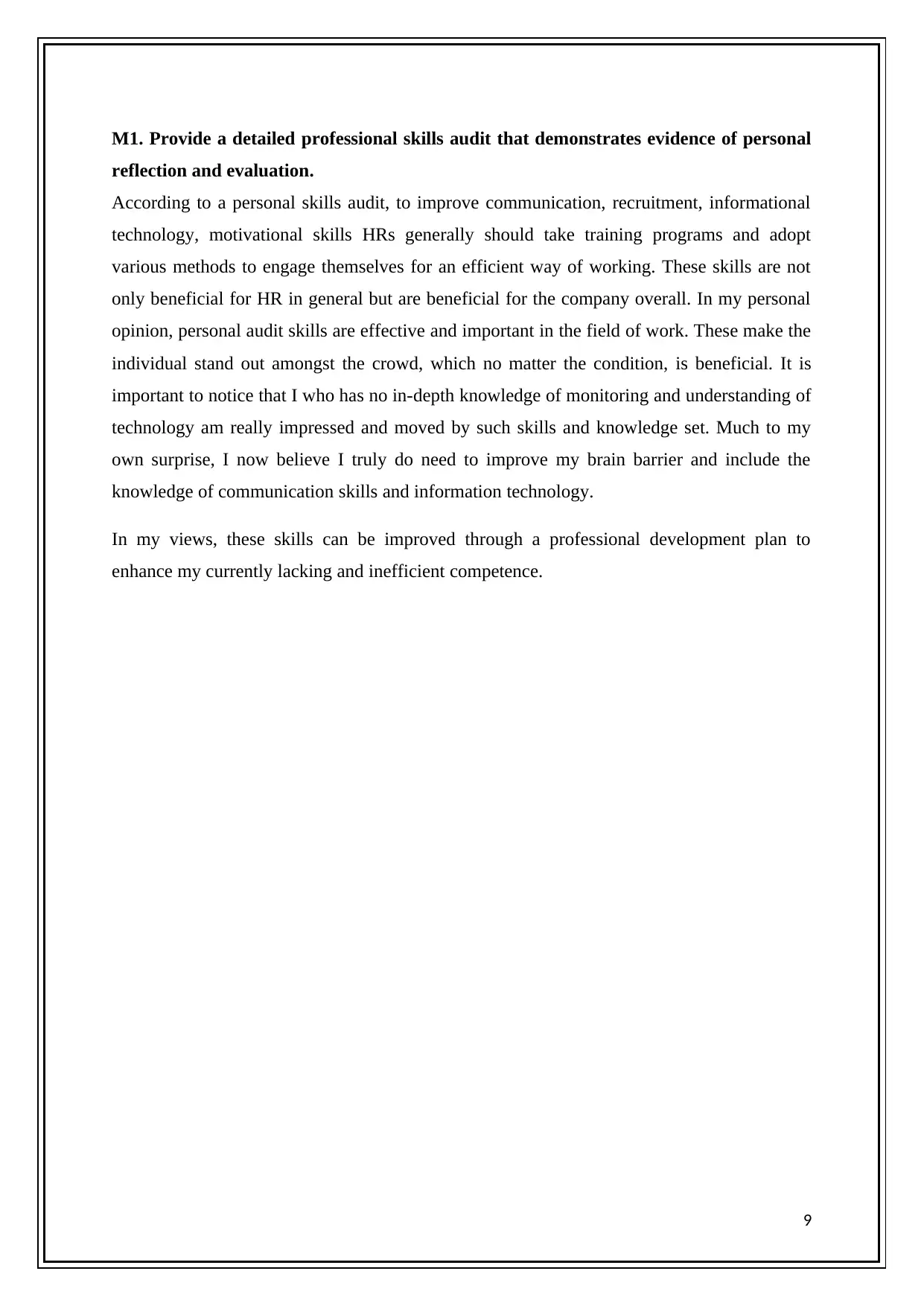
M1. Provide a detailed professional skills audit that demonstrates evidence of personal
reflection and evaluation.
According to a personal skills audit, to improve communication, recruitment, informational
technology, motivational skills HRs generally should take training programs and adopt
various methods to engage themselves for an efficient way of working. These skills are not
only beneficial for HR in general but are beneficial for the company overall. In my personal
opinion, personal audit skills are effective and important in the field of work. These make the
individual stand out amongst the crowd, which no matter the condition, is beneficial. It is
important to notice that I who has no in-depth knowledge of monitoring and understanding of
technology am really impressed and moved by such skills and knowledge set. Much to my
own surprise, I now believe I truly do need to improve my brain barrier and include the
knowledge of communication skills and information technology.
In my views, these skills can be improved through a professional development plan to
enhance my currently lacking and inefficient competence.
9
reflection and evaluation.
According to a personal skills audit, to improve communication, recruitment, informational
technology, motivational skills HRs generally should take training programs and adopt
various methods to engage themselves for an efficient way of working. These skills are not
only beneficial for HR in general but are beneficial for the company overall. In my personal
opinion, personal audit skills are effective and important in the field of work. These make the
individual stand out amongst the crowd, which no matter the condition, is beneficial. It is
important to notice that I who has no in-depth knowledge of monitoring and understanding of
technology am really impressed and moved by such skills and knowledge set. Much to my
own surprise, I now believe I truly do need to improve my brain barrier and include the
knowledge of communication skills and information technology.
In my views, these skills can be improved through a professional development plan to
enhance my currently lacking and inefficient competence.
9
⊘ This is a preview!⊘
Do you want full access?
Subscribe today to unlock all pages.

Trusted by 1+ million students worldwide
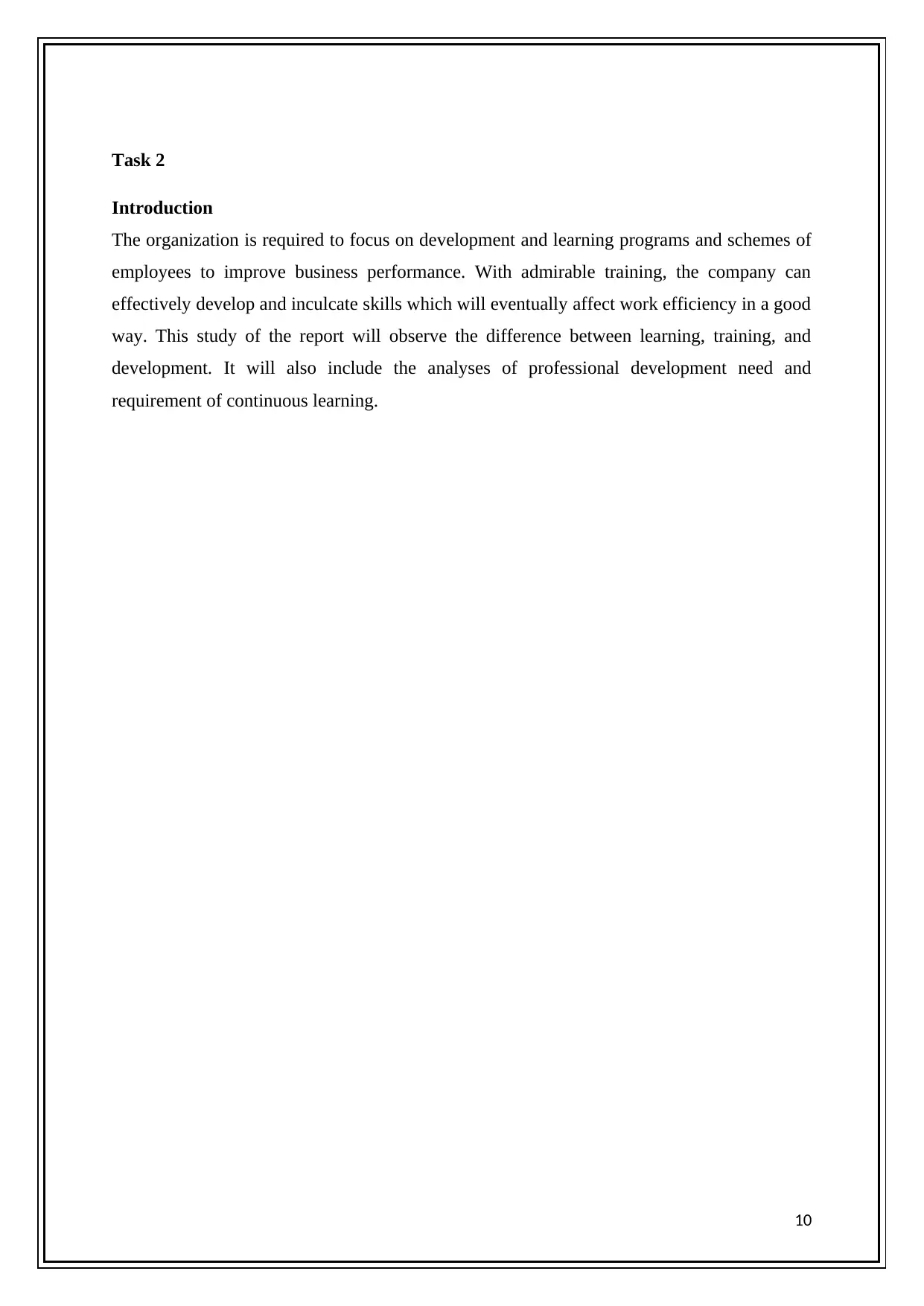
Task 2
Introduction
The organization is required to focus on development and learning programs and schemes of
employees to improve business performance. With admirable training, the company can
effectively develop and inculcate skills which will eventually affect work efficiency in a good
way. This study of the report will observe the difference between learning, training, and
development. It will also include the analyses of professional development need and
requirement of continuous learning.
10
Introduction
The organization is required to focus on development and learning programs and schemes of
employees to improve business performance. With admirable training, the company can
effectively develop and inculcate skills which will eventually affect work efficiency in a good
way. This study of the report will observe the difference between learning, training, and
development. It will also include the analyses of professional development need and
requirement of continuous learning.
10
Paraphrase This Document
Need a fresh take? Get an instant paraphrase of this document with our AI Paraphraser
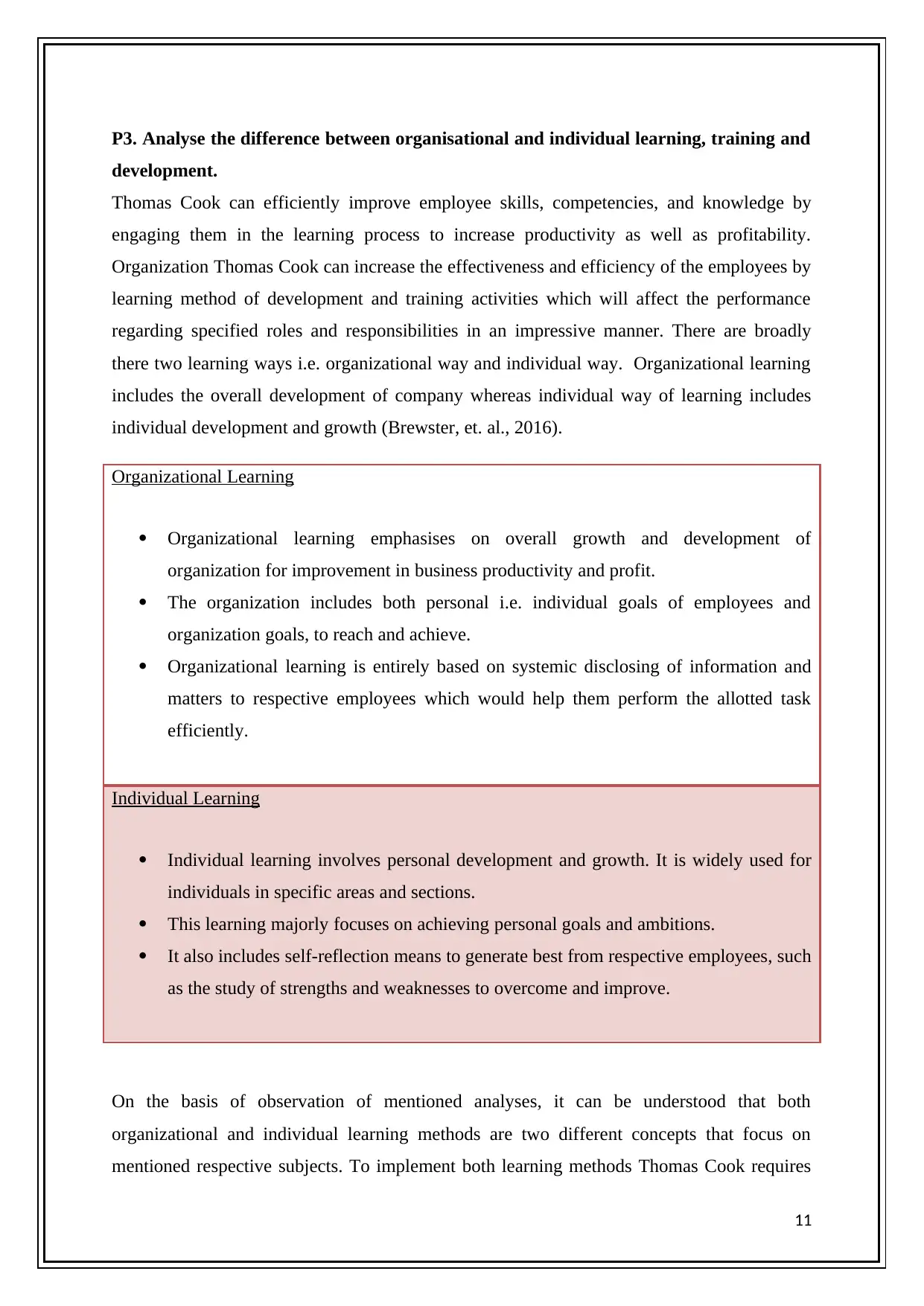
P3. Analyse the difference between organisational and individual learning, training and
development.
Thomas Cook can efficiently improve employee skills, competencies, and knowledge by
engaging them in the learning process to increase productivity as well as profitability.
Organization Thomas Cook can increase the effectiveness and efficiency of the employees by
learning method of development and training activities which will affect the performance
regarding specified roles and responsibilities in an impressive manner. There are broadly
there two learning ways i.e. organizational way and individual way. Organizational learning
includes the overall development of company whereas individual way of learning includes
individual development and growth (Brewster, et. al., 2016).
Organizational Learning
Organizational learning emphasises on overall growth and development of
organization for improvement in business productivity and profit.
The organization includes both personal i.e. individual goals of employees and
organization goals, to reach and achieve.
Organizational learning is entirely based on systemic disclosing of information and
matters to respective employees which would help them perform the allotted task
efficiently.
Individual Learning
Individual learning involves personal development and growth. It is widely used for
individuals in specific areas and sections.
This learning majorly focuses on achieving personal goals and ambitions.
It also includes self-reflection means to generate best from respective employees, such
as the study of strengths and weaknesses to overcome and improve.
On the basis of observation of mentioned analyses, it can be understood that both
organizational and individual learning methods are two different concepts that focus on
mentioned respective subjects. To implement both learning methods Thomas Cook requires
11
development.
Thomas Cook can efficiently improve employee skills, competencies, and knowledge by
engaging them in the learning process to increase productivity as well as profitability.
Organization Thomas Cook can increase the effectiveness and efficiency of the employees by
learning method of development and training activities which will affect the performance
regarding specified roles and responsibilities in an impressive manner. There are broadly
there two learning ways i.e. organizational way and individual way. Organizational learning
includes the overall development of company whereas individual way of learning includes
individual development and growth (Brewster, et. al., 2016).
Organizational Learning
Organizational learning emphasises on overall growth and development of
organization for improvement in business productivity and profit.
The organization includes both personal i.e. individual goals of employees and
organization goals, to reach and achieve.
Organizational learning is entirely based on systemic disclosing of information and
matters to respective employees which would help them perform the allotted task
efficiently.
Individual Learning
Individual learning involves personal development and growth. It is widely used for
individuals in specific areas and sections.
This learning majorly focuses on achieving personal goals and ambitions.
It also includes self-reflection means to generate best from respective employees, such
as the study of strengths and weaknesses to overcome and improve.
On the basis of observation of mentioned analyses, it can be understood that both
organizational and individual learning methods are two different concepts that focus on
mentioned respective subjects. To implement both learning methods Thomas Cook requires
11
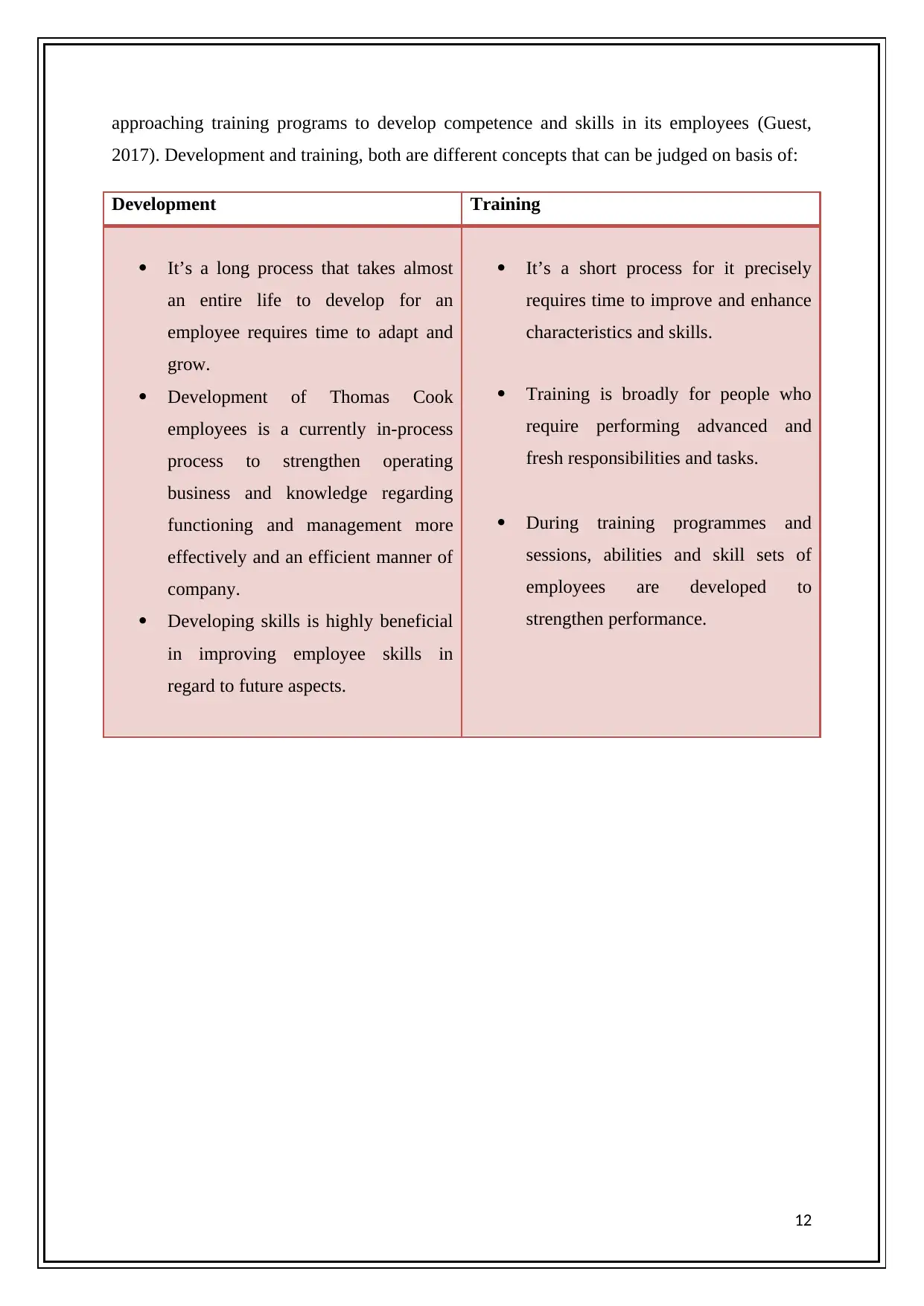
approaching training programs to develop competence and skills in its employees (Guest,
2017). Development and training, both are different concepts that can be judged on basis of:
Development Training
It’s a long process that takes almost
an entire life to develop for an
employee requires time to adapt and
grow.
Development of Thomas Cook
employees is a currently in-process
process to strengthen operating
business and knowledge regarding
functioning and management more
effectively and an efficient manner of
company.
Developing skills is highly beneficial
in improving employee skills in
regard to future aspects.
It’s a short process for it precisely
requires time to improve and enhance
characteristics and skills.
Training is broadly for people who
require performing advanced and
fresh responsibilities and tasks.
During training programmes and
sessions, abilities and skill sets of
employees are developed to
strengthen performance.
12
2017). Development and training, both are different concepts that can be judged on basis of:
Development Training
It’s a long process that takes almost
an entire life to develop for an
employee requires time to adapt and
grow.
Development of Thomas Cook
employees is a currently in-process
process to strengthen operating
business and knowledge regarding
functioning and management more
effectively and an efficient manner of
company.
Developing skills is highly beneficial
in improving employee skills in
regard to future aspects.
It’s a short process for it precisely
requires time to improve and enhance
characteristics and skills.
Training is broadly for people who
require performing advanced and
fresh responsibilities and tasks.
During training programmes and
sessions, abilities and skill sets of
employees are developed to
strengthen performance.
12
⊘ This is a preview!⊘
Do you want full access?
Subscribe today to unlock all pages.

Trusted by 1+ million students worldwide
1 out of 26
Related Documents
Your All-in-One AI-Powered Toolkit for Academic Success.
+13062052269
info@desklib.com
Available 24*7 on WhatsApp / Email
![[object Object]](/_next/static/media/star-bottom.7253800d.svg)
Unlock your academic potential
Copyright © 2020–2026 A2Z Services. All Rights Reserved. Developed and managed by ZUCOL.



